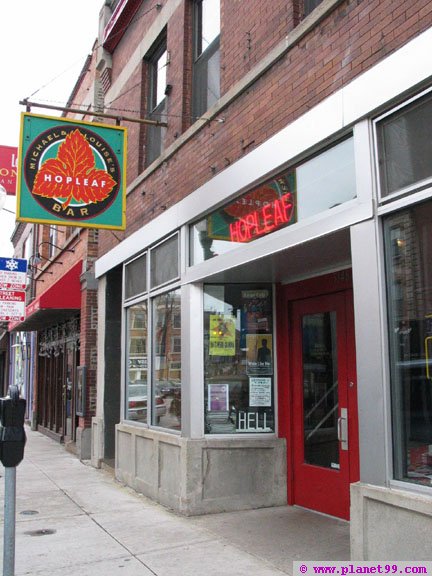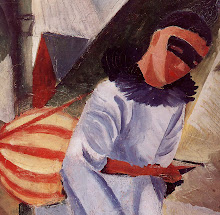Wednesday, February 28, 2007
Words I Don't Know
What an interesting example, too. This may be a regularish feature....
Restaurant Review: Hopleaf

While home in Chicago this past weekend, I went to a great restaurant, Hopleaf Bar, in the Andersonville neighborhood on the far Northside. It's billed as an authentic Belgian bar/restaurant. I love Belgian food and beer; in Philadelphia, I lived across the street from Monk's Cafe and was accordingly spoiled rotten. So the draw was natural.
Atmosphere. The decor inside Hopleaf was not very impressive; other than a few dimly illuminated posters and signs of Belgian beers, the place did not look very different from any other pub you might have visited. But of course, we didn't go for decor, necessarily, and on the essentials, Hopleaf delivered.
Hopleaf has adopted one of those habits that makes it so easy for people like me to plan a night -- they have put their entire food and drink menus online.
Drinks. Actually, they have two beer menus: one for draft and one for bottles. (They also have a wine menu, but come on, at a Belgian place?) I didn't try any of the bottled beers, but they seem to have all the standards (Chimay, LaChouffe, Duvel, etc.). I started with a tasty warm cherry beer called, I believe, Quelque Chose. It was strange to have hot beer, but not unpleasant; it reminded me of mulled wine. After that, I subsisted on a steady diet of Abbaye de Leffe (an old favorite) and a sharp-tasting Dutch number called Oud Beerstel.
As always with Belgian bars, though, a word of caution: the available drinks can change regularly.
Food. My friends and I had it on good authority that the frites at Hopleaf were outstanding. Alas, we were unimpressed. They were thinly cut and lightly seasoned; other than being served in a cone and coming with flavorless mayonnaise, they were no different than fries at most pubs I've visited. (They certainly don't hold a candle to those at Pommes Frites in Manhattan's East Village.) My suggestion: at least offer several different types of mayonnaise.
For the rest of our meal, we split two appetizers and a large order of mussels. The mussels were delicious, and remarkably plump. They were served à la belge in a large black pot, swimming in a light sauce made from the beer Wittekirke (which actually doesn't impress me when it comes in a glass). We also shared a sausage plate with white beans, and a rich but not overpowering duck breast prosciutto. (Did you know they could make that? I didn't.)
Lastly, I should add that Hopleaf stays open quite late: until 3am Saturday night, and 2am each other night. Yay Chicago!
For My First Trick...
Just today, I contributed a post to FIRE's weblog, The Torch. It concerns a debacle at the University of Wisconsin's Law School, where a professor made very provocative statements about the Hmong people. (There are a number of them in Wisconsin and Minnesota, and relations with non-Hmong neighbors are apparently testy.) The professor, Leonard Kaplan, allegedly said:
These statements were in an email from a student, KaShia Moua. It is not clear if she was in the class at the time or not. Prof. Kaplan has defended his statements, however; he says that he merely wanted to show how some defendants might rely on cultural practices and attitudes as a defense in serious crimes, such as rape.
An unavoidable problem with defending free speech rights is that it almost always involves defending speech that, rightly or wrongly, has offended someone. (Otherwise, it wouldn't need defending.) Prof. Kaplan's statements, if true, are in dubious taste, to my mind -- even allowing for his explanation. And yet, the pedagogical value of extreme examples is pretty clear. Provocative hypotheticals are a great way of getting students to test the boundaries of rules and the logic that underlies them, and professors should not be unduly hampered in their use of this effective tool.
One of the first cases I worked on at FIRE involved George Fletcher, a criminal law professor at Columbia University. He was taken to the woodshed for an exam question -- based on a composite of actual cases! -- in which the victim of a violent assault was actually thankful to her assailant because the attack caused her to miscarry the child she was bearing. As in the Kaplan case at UW-Law, the pedagogical value of such a shocking scenario is fairly clear -- yet Prof. Fletcher was told by Dean David Leebron that his exam question may amount to discrimination and harassment.
Prof. Fletcher was ultimately vindicated, thanks to FIRE's help. As for Prof. Kaplan, he may not need any help (knock on wood): the administration has thus far declined to take any action against him. UW-Law administrators have responded to this fracas in a much more responsible manner than did their Columbia Law counterparts. Let's hope this continues.
Inaugural Post
I expect to update this site at least once a day -- why would anyone bother coming back otherwise? I have enabled comments, which at this point is an act of sheer optimism. I will not modify comments for viewpoint, although I will modify them to ensure that discussion remains civil. I allow anonymous posting because I believe the right to anonymity is essential to free expression (even though I believe people should stand behind their words).
I appreciate your visit!

